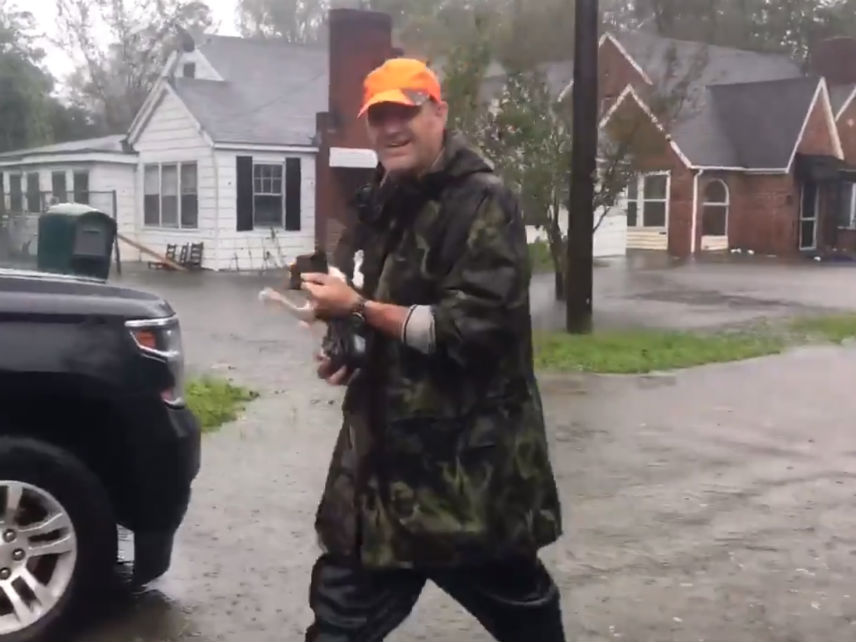Locals Carry Out Life-Saving Animal Rescues After Hurricane Florence
If you need help during a disaster, look to the locals before the government.

As is often the case during disasters, the floods that followed Hurricane Florence have produced many stories of good Samaritans helping those in harm's way. Take the animal rescuers.
A Tennessee trucker by the name of Tony Alsup decided to drive an old school bus from Greenback to various animal shelters in South Carolina that would be affected by the storm. He collected 53 dogs and 11 cats from shelters in North Myrtle Beach, Dillon, Georgetown, and Orangeburg. He took the animals to a shelter in Foley, Alabama, where they could be safe from the storm and adopted. Alsup made similar rescues in Texas, Florida, and Puerto Rico after storms hit last year. Alsup is particularly fond of dogs that are "big and a little ugly," and thus not as likely to be rescued.
Tennessee man uses school bus to evacuate 64 shelter animals in path of #Florence in South Carolina. Did same thing in hurricane zones in Florida, Texas & Puerto Rico.https://t.co/v6eWRKcr8E pic.twitter.com/NePcx0cnu6
— Joyce Peterson (@MemphoNewsLady) September 17, 2018
Just before Hurricane Florence made landfall, Twitter user Ali Standish shared a picture of North Carolinians waiting in line to foster pets to help shelters evacuate quicker.
The line of folks waiting to pick up foster dogs for the weekend so coastal shelters can evacuate here before #HurricanceFlorence. Many more behind me. Sometimes humans are okay. ?? pic.twitter.com/niyCRDygOV
— Ali Standish (@AliStandish) September 12, 2018
CBS reporter Adriana Diaz came across a pastor holding a wet kitten in the middle of North Carolina rains and floods. The man was part of a church group that was going around helping animals. Diaz also showed two dogs waiting on the stairs after being rescued by the church group.
HAPPENNING NOW: Pastor rescues kittens & dogs left behind in Jacksonville, NC where flooding has started. More on @CBSEveningNews #HurricaneFlorerence pic.twitter.com/V6qnb8rIv5
— Adriana Diaz (@adrianasdiaz) September 14, 2018
Three workers at an animal shelter in Carteret County Humane Society in North Carolina found themselves trapped with 123 animals. The flood waters forced the staffers to the second floor, only to face the danger of a collapsed roof. The Cajun Navy, a group of Louisiana-based boat owners who volunteer for rescues, helped evacuate the shelter.
The animals have been rescued
— CajunNavyRelief (@CajunNavyRelief) September 15, 2018
Reason's Jesse Walker has observed that federal agencies—and bureaucratic charities like the Red Cross—lack the decentralized flexibility and effectiveness displayed in efforts like these. The most reliable actors in times of crisis tend to be those with local knowledge, proximity to the disaster's victims, and an ability to maneuver quickly.
Bonus links: The Federal Emergency Management Agency (FEMA) has a long track record of poor storm preparedness and response. Last year the agency managed to leave nearly a million unopened water bottles on a Puerto Rican airstrip; they were discovered a year after Hurricane Maria hit the island. If you want help, you'd do better looking to the Waffle House.


Show Comments (22)